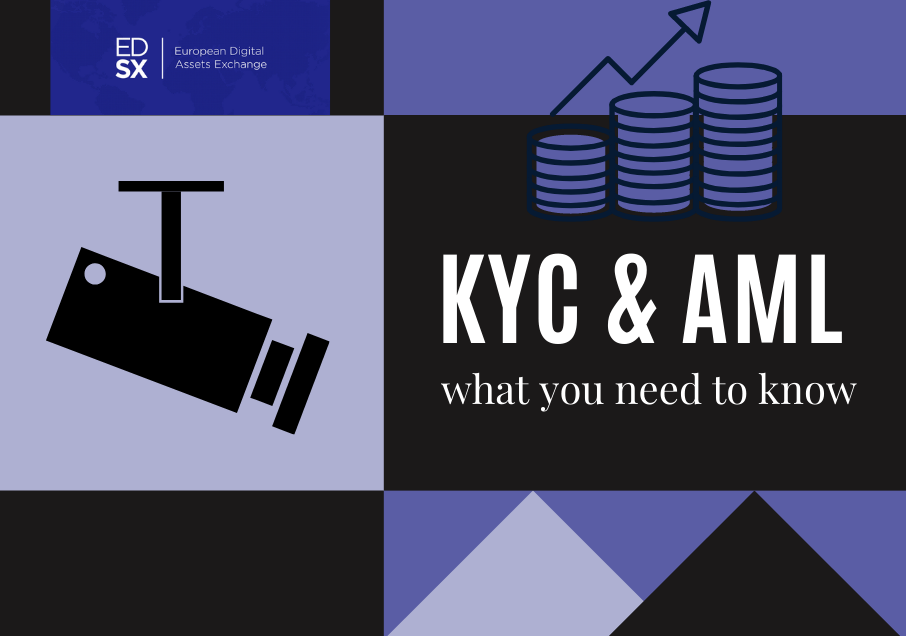It goes without saying that in any type of trading – especially if we’re talking about online exchange of cryptocurrencies – safety is the number one priority. The “Know You Client” (or “Know Your Customer”) and the “Anti Money Laundering” regulations work to safeguard your data and preserve your funds from scams if you’re wondering how such protections occur. But what is KYC and AML exactly?
What’s the Difference Between KYC and AML?
Even though closely related, there is a difference between the two: in banking, KYC rules are the steps institutions must take to verify their customers’ identities; AML operates on a broader level they are the measure institutions take to prevent and combat money laundering, terrorism financing, and other financial crimes.
Banks use KYC and AML compliance to maintain secure financial institutions.
KYC: Know Your Client
Know-your-customer controls serve investors and advisers. KYC demands clients share risk tolerance, knowledge, and finances. This helps match investments to an individual’s specific needs. It gauges variability in returns a person can accept. Advisers benefit also. KYC ensures only suitable options fill a portfolio. Both sides avoid misaligned choices. Clients get protected picks. Advisers face no criticism for inappropriate selections. Regulations establish important guidelines for the relationship between investor and industry.
The compliance typically involves requirements and policies such as risk management, customer acceptance policies, and transaction monitoring.
The Know Your Client (KYC) rule is an ethical requirement for those in the securities industry who are dealing with customers during accounts opening and maintenance. There are two rules which were implemented in July 2012 that cover this topic together: Financial Industry Regulatory Authority (FINRA) Rule 2090 (Know Your Customer) and FINRA Rule 2111 (Suitability):
- Know Your Customer Rule 2090: every broker-dealer should use reasonable effort when opening and maintaining client accounts. Regulations require that all data and essential facts be recorded and that any authority acting on the customer’s behalf must be identified.
- FINRA Rules of Fair Practices, 2111: a broker-dealer must have reasonable grounds when recommending what is suitable for a customer based on the client’s financial situation and needs. This responsibility means that the broker-dealer has done a complete review of the customer’s current facts and, including other securities before making any purchase, sale, or security exchange.
Requirements for KYC Compliance
The U.S. Financial Crimes Enforcement Network (FinCEN) has set baseline requirements for KYC in conjunction with the core requirements for the due diligence program. Regulations require financial institutions to conduct deeper assessments of their clients’ risk profiles to prevent money laundering.
Customer Profile
Investment advisors must understand each client. They discover details like age, existing investments, taxes, needs, experience with investing, how long to keep money in, access to cash, and ability to handle risk.
The government wants advisors to know their clients well. Before starting an account, a new person gives key facts. These consist of name, birthdate, where they live, job status, yearly pay, total worth, goals for investing, and IDs.
KYC in Cryptocurrency
Cryptocurrency offers benefits like decentralization and confidential financial exchanges. But these same qualities also enable money laundering. Without oversight, criminal schemes can use cryptocurrency to hide illegal profits and clean dirty money. Governments want to curb these risks. Now regulators examine ways to apply know-your-customer rules from traditional banks to the crypto world. Platforms may need to identify users similar to how normal banks do. This could reduce anonymity and curb laundering. But it may also interfere with decentralization. Overall regulators seek a balance between innovation and transparency in cryptocurrency markets.
Although not yet mandatory, many platforms have implemented KYC practices.
Because crypto-to-crypto exchanges don’t deal with traditional currency, they do not have the same pressures to employ KYC standards as with exchanges that deal with Fiat currencies.
Fiat-to-crypto exchanges facilitate transactions involving fiat currencies and cryptocurrencies. Since fiat currency is the official currency of a nation, most of these exchanges employ some measures of KYC. Fortunately, financial institutions should have already vetted their customers according to KYC requirements.
In pills:
(from Investopedia)
- Know Your Customer (KYC) are a set of standards used within the investment and financial services industry to verify customers, their risk and financial profiles.
- In the investment industry, KYC stipulates that every broker-dealer should use reasonable effort regarding client accounts.
- The Financial Crimes Enforcement Network (FinCEN) established minimum KYC requirements, including verifying beneficial owners and setting standards for dealing with third parties.
- The SEC requires that a new customer must provide detailed financial information before opening an account.
- The cryptocurrency market is not obliged to employ KYC standards, although some have to.
Know Your Customer (KYC) are a set of standards and requirements that investment advisors and financial services companies use to verify the identity of their customers and any associated risks. KYC also ensures investment advisors know detailed information about their clients’ risk tolerance and financial position.
The U.S. Financial Crimes Enforcement Network (FinCEN) prescribed rules financial institutions must follow when verifying the identity of customers and their beneficial owners, if any. They must verify the circumstances around the customer relationship, as well as monitor and report any suspicious or illegal activity.
Focus is shifting to cryptocurrency markets as pressures to conform to KYC standards increase.
AML: Anti Money Laundering
Anti Money Laundering (AML) refers to the laws, regulations, and procedures intended to prevent criminals from disguising illegally obtained funds as legitimate income.
It became a global prominence in 1989, when a group of countries and organizations around the world formed the Financial Action Task Force (FATF). Its mission is to devise international standards to prevent money laundering and promote their implementation. In October 2001, following the 9/11 terrorist attacks, FATF expanded its mandate to include combating terrorist financing.
The IMF fights money laundering globally. It pushes members to follow standards stopping terrorist cash flows. Laws target crimes like market manipulation, trafficking, corruption and tax dodging. They also target disguising the methods and money from these illegal acts.
One rule in place is the AML holding period, which requires deposits to remain in an account for a minimum of five trading days. The holding period is intended to help financial institutions with anti-money laundering efforts and risk management.
Banks and other financial institutions often appoint AML compliance officers to oversee anti-money laundering policies and ensure compliance.
Addressing Suspicious Activity
It’s up to financial institutions to monitor customer deposits and other transactions to ensure they aren’t part of a money-laundering scheme. The institutions must verify the origin of large sums, monitor suspicious activities, as well as report cash transactions exceeding $10,000. In addition to complying with AML laws, financial institutions must ensure clients are aware of them.
In today’s regulatory environment, extensive records are kept on just about every significant financial transaction.
How money is laundered and how can it be stopped
Criminals often launder money through legitimate businesses they control. These businesses deposit illicit cash from criminal operations as ordinary business proceeds. Later, the criminals withdraw the now “clean” money. Launderers may also transport cash abroad and deposit it in foreign banks. Small cash deposits over time can avoid detection where large sums raise red flags. Launderers may convert illicit cash into other financial instruments too, like money orders or traveler’s checks. They will sometimes invest the money, using dishonest brokers willing to ignore the rules in return for large commissions.
Unfortunately, money laundering cannot be completely stopped but only reduced through constant vigilance.
Financial institutions can monitor customer deposits and other transactions to ensure they aren’t part of a money-laundering scheme.
In pills:
(from Investopedia)
- Anti Money Laundering (AML) seeks to deter criminals by making it harder for them to hide ill-gotten money.
- Criminals use money laundering to conceal their crimes and the money derived from them.
- AML regulations require financial institutions to monitor customers’ transactions and report on suspicious financial activity.

Based in Zug, the platform is fully compliant with all Swiss laws related to financial intermediaries, banking, anti-money laundering, and organized trading facilities. Among its core values, there are innovative solutions through blockchain technology, which ensures security and liquidity.
EDSX is the first platform in Europe with primary and secondary markets for both institutional and retails. EDSX is a pioneering platform that employs the world’s leading technology to globally list security tokens in both primary and secondary markets, listing digital securities of real financial instruments to the public with a decentralized peer-to-peer exchange. Our goal is to fully engage every aspect of the financial revolution.
Do you have a question for us?
Send your query here:
[email protected]

